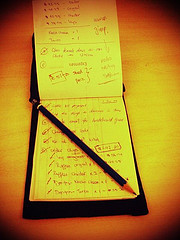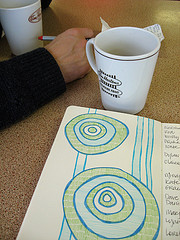
photo by Tony Trần |
[Note: This is part 4 of a 5 part series. When all five parts are published you will be able to find them at Talk To The System.
When we are learning the basics of tapping we are taught the more specific we can get the more effective the tapping is going to be. This is not only true for specific issues, but also specific parts of the system. I was inspired by the exercise I call “The Grounding Process” to look at each part of our system and tap for it. ]
We are not just who we are now, but a sum total of all that has happened. There are parts of us that are still clinging to the past as if it is still happening. Many times when working with clients we find our way to working with the younger self. Much of who we are today is informed by our younger years. BUT it is not who we are in totality and our past is not written in stone in such a way that it can never be changed.
I have found it very helpful to speak to my younger self. It is important to let it know that it is allowed to grow, change, and absorb the wisdom of my older self. This is how I tap for and with my inner child. Take a deep breath and just tune in to the younger you.
You are safe…There is no judgment here…You are allowed to share what everyou want…And you are allowed to share nothing…You are safe…There is no judgment of you here…There is only love…I want you to know you are not alone…You are safe…You are loved…You are allowed to think what you want…You are allowed to say what you want…You are allowed to feel what you need to feel…I am here for you…You are safe…There is no judgment for you here.
You are allowed to ask for what you need…It can be big…It can be small…It can be nothing at all…You are allowed to ask for what you need…
You have access to all the information and resources we have gained in our life…I have progressed so much in my life…I have gained wisdom…I have learned lessons…I want you to have access to all this information…Because you are me…You have permission to bring all that I know now to the past and what I went through…I know some of this information is going to contradict what you believe…And what you have been told…Just because important adults in your life said it is true, doesn’t mean it is true…Trust our new wisdom…We have lived it…We know its truth…
If you need anything you can ask…Anytime…I want you to know you are loved…And safe…There is no judgment of you here
I asked a number of friends and fellow practitioners what they would like to say to their inner child. Take a deep breath and tap along:
You are doing the best you know how to do. Even when you make mistakes you're not doing anything wrong. There is nothing wrong with you.
Jade Barbee
I see you, I honor you. I honor how hard it was for you and all the things you wanted but could not get. I am open to hearing exactly what you still need today and learning how to ask for that need to be met in my life right now. And, in this present moment, I see and honor the beautifully unique and brilliant qualities you have, but learned to keep hidden because it was not safe. I give you permission to totally shine right now with me, because I love you and I understand!
Margaret M. Lynch
You are special, you are loved
Pamela Bruner
You are safe. You are loved. You are perfect. All is well. You are not alone. I am always here.
Rev. Anne Presuel
Trust that what comes to my heart is right for me. The decisions I make can't be connected to what others might think of me.
Tammy Evevard
“You are safe and I, the grown-up, am here to take care of you.
I'm really really sorry that you went through this alone. I'm here now for you.
What you have to say is really really important to me. I'm listening.
((((((((((((hugs))))))))))))))))))
It's okay to be mad. It's okay to be really really really mad. It's okay to be really really really really mad.
Is it okay if I sit next to you for a bit?
Deborah Donndelinger
You are awesome, you matter, and you are worthy and deserving of the best life has to offer.
Brad Yates
“Our life was not designed to be as hard as we make it. We complicate everything with our need to feed our insatiable ego. Often times we become convinced that we must always win, be right, or be considered important in order to be happy.
Life was meant to be simple. We were created to love one another..not to separate ourselves from others. We were created to serve one another…not to be served. We were created to be grateful for the life we have..not lamenting for the things we don't have. We were created to be joyful…not to be creatures of our own fear.
Life is beautiful. I just need to get out of my own way to see it.
Quit being afraid of living a much more simple life.”
John Roedel
You are loved, you are safe, know that I am deeply interested in you, that I love listening to you and that this is only the beginning. Oh and also – that there is always time for play!
Rhona Clews
It is safe to be seen, safe to accept the challenges life offers and really, you can be powerful and kind at the same time.
Andy Bryce
 What are the things your inner child needs to hear? Click here to add your own thoughts and comments or read what others have to say. I would really love to hear what you think!
What are the things your inner child needs to hear? Click here to add your own thoughts and comments or read what others have to say. I would really love to hear what you think!













